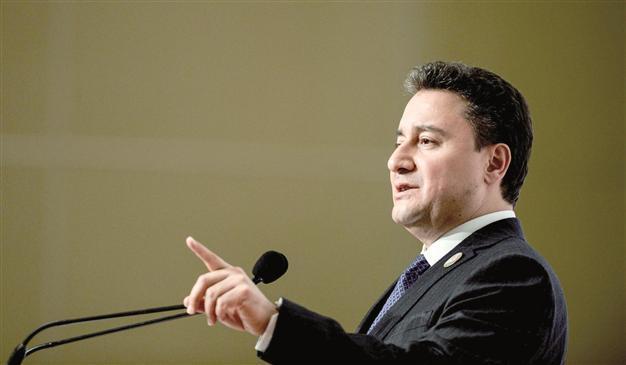Political polemics over currency rates push up risk premiums of a country: Turkish deputy PM
ISTANBUL

AA Photo
Making currency rate policies become a point of daily political polemics in a country has many negative effects, pushing the country’s risk premiums and rates up and making it less predictable, Deputy Prime Minister Ali Babacan said on Feb. 12, in a TV interview broadcast on state-run TRT.“It is good that Turkey’s Central Bank communicates about currency rates when necessary,” Babacan said.
Although the government has not defined a currency rate target, it is not possible for the Central Bank to not be interested in what is happening in the currency rates, as the main priority of the Bank is to maintain price stability, he added.
He noted that the global currency markets are very volatile at the moment and the recent sharp decrease in the value of the Turkish Lira was mainly caused by dramatic fluctuations in global markets.
Babacan noted that the Central Bank will “do what is necessary” for the sake of price stability by closely following the currency rates, adding that ministers’ currency rate targets are their own ideas, and the final addressee for assessments on currency rates should be the Central Bank.
The Monetary Policy Board of the Central Bank is composed of people with high technical capacities and the board members assess all criticisms, he said, adding that he won’t make any comments about the board’s possible interest rate decision in its February meeting.
Babacan has emerged as one of the staunchest defenders of Central Bank independence in recent weeks, amid strong criticisms from senior government officials and President Recep Tayyip Erdoğan about its interest rate policies.
The deputy prime minister also said Turkey’s current account deficit-to-GDP may decrease to 4 percent this year, from around 5.6 percent in 2014, as long as oil prices will be around $50-60 per barrel.
“Turkey’s current account gap shrank by $19 billion to $46 billion in 2014. We have not seen the positive effects of oil prices yet,” Babacan said.
He also commented on the controversial recent seizure of Bank Asya, linked to the government’s ally-turned-enemy the Gülen Movement, saying the documents of the bank’s shareholders had not been submitted properly to the banking watchdog BDDK.
“According to the 5th paragraph of the BDDK’s banking law’s 18th article, the watchdog had asked for a number of documents, which show whether the shareholders observe international standards to be a bank’s shareholder. But the documents were not submitted to the banking watchdog properly. The documents of a majority of the bank’s shareholders were not offered … The banking watchdog will examine the entirety of the documents and information. Then it will make its final decision,” Babacan said.
Shareholders in Turkey’s Bank Asya began legal action on Feb. 11 in an attempt to regain control of the Islamic lender after regulators dismissed the board and took over its management. Regulators dismissed the board last week, citing a lack of sufficient transparency at the bank and saying shareholders had failed to provide the required documentation.
















